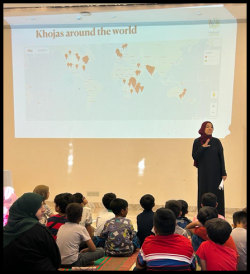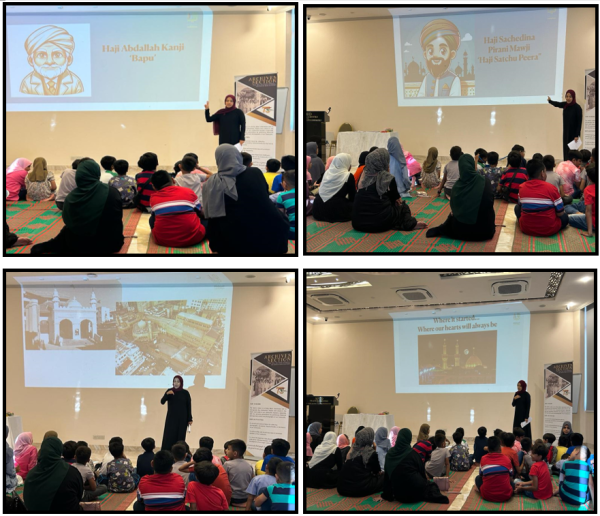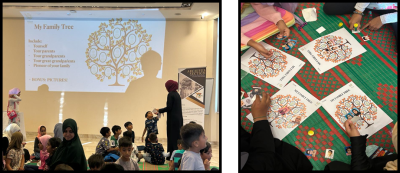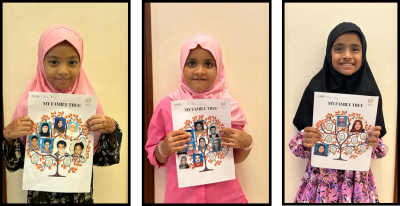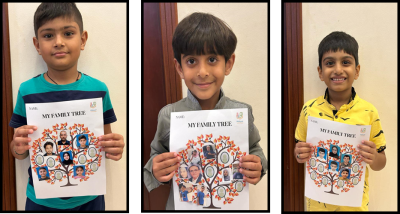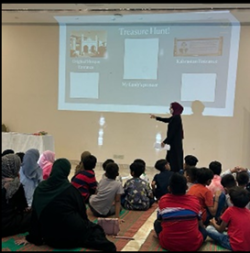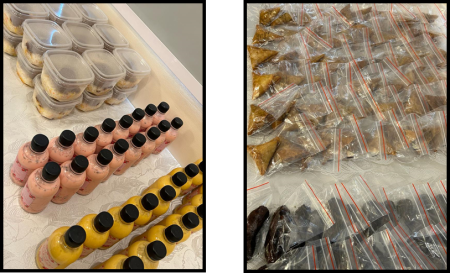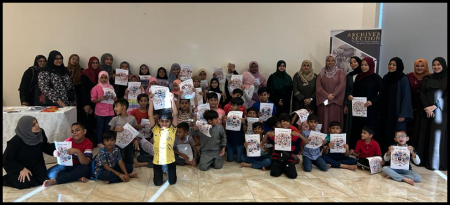Khoja Heritage Project
Contents
Preface
Allah has blessed humankind with the ability to develop complex and intelligent cultures by way of intellectual reflections, and scientific discoveries as well as spiritual achievements. Our ethnicity, heritage and culture are part of what make humans distinct from the animals. Further, each ethnic group or a nation, has gone about developing its cultural heritage in their own ways - based on their geographical locations, social values, beliefs, religious customs, dress, art, cuisine to name but a few - that distinguish them from each other.
Indeed the Qur’an recognizes this:
“O mankind! Lo! We have created you male and female, and have made you nations and tribes that ye may know one another. Lo! the noblest of you, in the sight of Allah, is the best in conduct. Lo! Allah is Knower, Aware.” (49:013)
Heritage - A Sense of Unity
Yet in this globalized world of today, not all of us feel a connection with our cultural heritage, while others yearn to connect. Some feel that these things are no longer relevant during these modern times. For others, exploring cultural heritage offers enormous benefits. What is it about cultural heritage that draws people to it? It gives us a connection with people of similar heritage, allows us to identify with others of similar mindsets and backgrounds. It can bring about an empowering sense of unity and belonging within a group. It also allows us to better understand previous generations and the history of where we come from.
Above all, preserving our cultural heritage engenders a positive feeling of communal support. Those that identify strongly with a certain heritage are often more likely to help out others in that same community. The unique and widely acknowledged distinction of the Khoja Shia Ithnasheri Community has been that very trait, of helping each other during times of trials and tribulations on our journey from the ports of Porbandar and Mandvi to almost 40 countries today. The testimony of that bonding lies the creation an enviable network of Jamaats, Regional Federations and the World Federation which bind us together.
Evolution of KHP
Of late there have been many calls by members of the Community to facilitate and enhance the understanding of our heritage and culture. Hence the World Federation has embarked on the Khoja Heritage Project (KHP). This important project will be co-chaired by Shaykh Kumail Rajani, the current Lead of Islamic Education and Dr. Hasnain Walji, former President of the World Federation and Producer of the acclaimed documentary The Khojas: A Journey of Faith. Plans are underway to include numerous individuals who have a special interest in history and heritage to assist in delivering on the objectives. Mumineen interested in helping are cordially invited to write to the secretariat via a special email: [email protected]
Mission & Motive
The KHP mission is to collect, collate, document, preserve and promote the cultural heritage and legacy of our ancestors for posterity with a view to help:
1. Appreciate the struggle and adventures of our forefathers
2. Revive the spirit of unity among the our community members
3. Engender pride in the rich cultural heritage of the Community
4. Become cognizant and be prepared for the challenges facing the upcoming generations
5. Learn from the different phases of the Community life to make better decisions as we evolve as a Community
6. Reinvigorate the spirit of the "Khoja" heritage and good practices in different socio-religious activities
7. Be an exemplar and inspirational Community for others.
“I passionately believe that a concerted effort to preserve our heritage is a critical link to our faith and cultural legacy. The Khoja Heritage Project embodies academic disciplines and skills including history, journey of faith and trade, sociology, textual analysis and visual perception, to name but a few. The project doesn’t focus on sheer preservation of the history rather it is perceived to be a benchmark for the confrontation of the new challenges the community is facing in the contemporary world.” Shaykh Kumail Rajani
Amongst the numerous projects the team will embark upon are:
1. Collection & Digitalizing the books related to Khoja history and culture
2. Capturing Oral History from our elders
4. Khoja Family Tree
5. KhojaPedia
6. Recognition awards for contribution to the Khoja Community
7. Helping organize Khoja Heritage day and Exhibitions
8. Identify and label Khoja Heritage Sites
9. Academic Engagement and Conference
“Our history and heritage plays a vital role for a community. We learn from our past in order to plan our future. History serves as a model of who we are and what we are to be. I believe that the Khoja Heritage Project will engender an even greater sense of belonging and help retain the valuable social capital that our forefathers have built up over several generations. ” Dr Hasnain Walji For further information please contact: [email protected]
Reference: https://www.world-federation.org/news/khoja-heritage-project-making-past-part-our-future
Events
Senior Citizens Zainabiyya Day 2016 (Kumail Rajani)
https://www.youtube.com/watch?v=VJE_C0JMCEs
Senior Citizens Bibi Fatima Zahra Day 2017 (Kumail Rajani)
https://www.youtube.com/watch?v=uvghVdrTUuo
Khoja Heritage Day 2023 at Africa Federation
A Storytelling Journey for children marking the Khoja Heritage Day 2023
In a captivating storytelling session held at Afed Tower on November 24th, 2023, young boys aged 7 to 10 and girls (aged 7 years and above) were taken on an enchanting journey back in time. This storytelling event, part of the Khoja Heritage Events leading up to the Khoja Heritage Day on 2nd December 2023, served as a crucial link between generations, ensuring that the rich tapestry of the community's history remains woven into the fabric of their identity.
The Storytelling Session was made possible through the collaborative efforts of the AFED Archives Section, in conjunction with the Hidayat Workshop Team, and was skillfully facilitated by Sr. Aamina Bhimani. Her expertise added a special touch to the storytelling experience, creating a captivating atmosphere that transported the young participants into the heart of their community's vibrant past. The fusion of history and storytelling, coupled with Sr. Aamina Bhimani's guidance, made this session an unforgettable and cherished moment for all involved. The narrative unfolded the remarkable story of the Khoja Shia Ithna-Asheri community – a group of adventurous individuals hailing from the lands of Cutch and Kathiawar in India. These brave pioneers, driven by faith and the spirit of adventure, set sail across the Indian Ocean, facing storms and challenges to establish a new home in East Africa. At the heart of this tale was Haji Dewji Jamal, a visionary leader born in India. His transformative journey to Karbala in 1873, where he solidified his beliefs, marked the beginning of a grand adventure. Bringing back Mulla Qadir, who imparted knowledge about Shiism and correct Islam, Haji Dewji Jamal set the stage for a migration that would shape the destiny of the Khoja Shia Ithna-Asheri community.
As the dhows, traditional sailing vessels, sailed towards East Africa, laden with spices, textiles, and unwavering faith, the pioneers faced adversity with prayers, faith and shared stories. The challenges of the journey were not just a test of physical resilience but also a testament to the bonding and camaraderie among the community members. The arrival on the shores of East Africa marked not only a geographical shift but a cultural blending as the Khojas embraced the local communities, building mosques and community centers. Among the key figures highlighted in the session were Haji Abdallah Kanji and Haji Sachedina Pirani Mawji, whose contributions played a pivotal role in the community's growth. Haji Abdallah Kanji, a successful businessman in Kenya, not only prospered in his endeavors but also contributed significantly to the community by constructing houses and establishing the Alibhai Panju school. Meanwhile, the simplicity and dedication of Haji Sachedina Pirani Mawji, known as Satchu Peera, left a lasting impact on the community in Dar es Salaam.
The storytelling session aimed not only to recount historical events but also to instill a sense of pride and awareness of the community's heritage in the young audience. In a world characterized by rapid change and globalization, understanding one's roots becomes a crucial anchor. The Khoja Shia Ithna-Asheri community, while embracing new cultures and languages in East Africa, never forgot their origins. They celebrated festivals, wore traditional attire, and passed down stories through generations, ensuring the preservation of their unique cultural identity. The event also incorporated a meaningful activity focused on tracing familial connections through a family tree exercise. Participants were encouraged to bring photographs of themselves, their families, and ancestors, creating a visual representation of their interconnected heritage. The family tree activity served as a hands-on experience for the participants, allowing them to actively contribute to the exploration of their roots.
Moreover, the event went beyond storytelling with a creative twist – a treasure hunt challenge. This interactive component engaged the children, encouraging them to explore and connect with tangible aspects of their heritage. By doing so, the event not only transmitted historical knowledge but also sparked curiosity and a hands-on connection with their cultural roots. To further enhance the cultural experience, the children were treated to a delightful culinary journey with a serving of traditional Khoja cuisine. Delicacies carefully curated from the community's culinary heritage were offered as cultural takeaways. The flavors and aromas of the dishes not only tantalized the taste buds but also served as a sensory extension of the rich cultural tapestry being celebrated.
In essence, events like these play a vital role in promoting cultural heritage among the younger generation. By understanding and cherishing the struggles, sacrifices, and triumphs of their ancestors, the children are better equipped to appreciate the values and traditions that define their community. The Khoja Shia Ithna-Asheri community's journey serves as a testament to the strength of human spirit, the importance of faith, and the power of cultural blending. In sharing this narrative, we ensure that the flame of our heritage continues to burn bright, passed from one generation to the next.
SECRETARIAT
ARCHIVES SECTION OF THE AFRICA FEDERATION
date: 26th January 2024 (14th Rajab 1445 AH)
